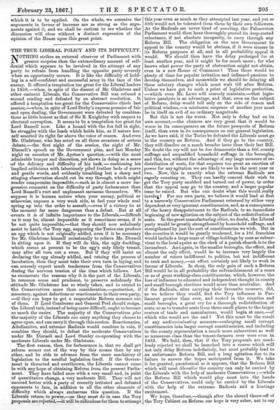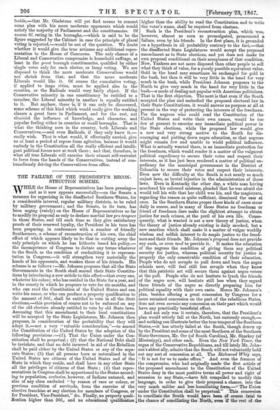'THE TRUE LIBERAL POLICY AND ITS DU FICULTY.
NOTHING strikes an external observer of Parliament with greater surprise than the extraordinary amount of self- *denial which appears to be involved in the attempt of any party to refrain from handling the opposite party severely when an opportunity occurs. It is like the difficulty of hold- ing in a self-confident and successful army in the face of the enemy. It offered a temptation too great for the Liberal leaders in 1859,—when, in spite of the dissent of Mr. Gladstone and other eminent Liberals, the Conservative Bill was refused a second reading and defeated by an abstract resolution. It offered a temptation too great for the Conservative chiefs last session,—when, in spite of Lord Derby's express promise of fair and open dealing, the Government were defeated by combina- tions as little honest as that of Sir R. Knightley with respect to electoral corruption. It seems to be a temptation too great for lord Russell now. Like a hound with the fox full in sight, he struggles with the leash which holds him, as if nature her- self asserted its right far above the voice of reason. And even Mr. Gladstone, who has acted on all three occasions of serious debate,—the first night of the session, the night of Mr. -Disraeli's speech on the Government plan, and last Monday night on occasion of Mr. Ayrton's question,—with the most admirable temper and discretion, yet shows in doing so a sense of the delicacy and difficulty of his task, — cushioning his implied criticisms with laboriously piled feather beds of suave and gentle words, and evidently trembling lest a sharp and stinging observation should cut its way through, which might Tender compromise impossible,—such as is almost a more im- pressive comment on the difficulty of party forbearance than Lord Russell's curt and unpleasant sarcasms themselves. We suppose it is human nature when your enemy, political or otherwise, exposes a very weak side, to feel your whole soul spring up into the order to assault,—even if a victory be at the moment far more dangerous than a defeat. But at all :events it is of infinite importance to the Liberals,—difficult as it may be, almost impossible as it sometimes seems, if it be not quite impossible,—that they should now sedulously assist to hatch the Tory egg, supposing the Tories can produce an egg which is not originally addled, even if it be necessary Tor Mr. Gladstone himself occasionally to relieve Mr. Disraeli in sitting upon it. If they will do this, the ugly duckling, -which seems at present to be the egg's only likely tenant, may after all turn out a swan. But if they will insist on declaring the egg already addled, and vetoing the process of incubation, then they must take their own turn in laying, and van scarcely expect much tenderness from the Conservatives ',luring the nervous tension of the time which follows. Let -us enumerate the reasons why it is the part of the Liberals, in common sense and prudence, to preserve sedulously the attitude Mr. Gladstone has so wisely taken, and to extend to the Conservatives more than cohsideration,—protection, if -necessary, against defections or reactionaries in their own party, —if they can hope to get a respectable Reform measure out of them. If Lord Cranborne and General Peel should resign, the Liberal task, instead of being more difficult, ought to become _so much the easier. The majority of the Conservatives plus 'the majority of the Liberals can carry anything they choose to agree upon, and can carryit through this session. Reactionaries, Aduthirnites, and extreme Radicals would combine in vain, if combine they should, to defeat the moderate Conservatives -under Mr. Disraeli and Lord Stanley co-operating with the moderate Liberals under Mr. Gladstone.
The first reason, then, for forbearance is, that we shall get _reform sooner out of the way by this means than by any other, and be able to advance from the mere machinery of legislation to the needful legislation itself. If the Govern- ment is thwarted and overthrown, the Liberals cannot come in with any hope of obtaining Reform from the present Parlia- -meat. They have failed once with a very small and, in point of quantitative change, a very moderate Bill. They will not succeed better with a party of recently irritated and defeated opponents to face, in addition to all the other elements of difficulty which always embarrass this question. If the -Liberals return to power,—as they must do in case the Tory proposals are rejected,—it will be ridiculous for them to attempt this year even as much as they attempted last year, and yet so little would not be tolerated from them by their own followers. As the Radicals are never tired of asserting, the Palmerston Parliament would then have thoroughly proved its deep-rooted reluctance, if not absolute incapacity, to carry through any Reform Bill. The obligation on the new Government to appeal to the country would be obvious, if it were sincere in its Reform purposes at all, and in all probability appeal it would. We should then have the delay prolonged for at least another year, and it might be for much more ; for who knows what power the party of obstruction might not obtain, even in a new House of Commons? Thus there would be plenty of time for popular irritation and inflamed passions to develop themselves, and meanwhile we should be delaying all those salutary changes which must wait till after Reform. Unless we have got to such a point of legislative perfection, —which even Mr. Lowe will scarcely maintain,—that legis- lative paralysis is an advantage, and that, even on the subject of Reform, delay would tell only on the side of reason and political wisdom,—a minimum suspense of another year must be in itself an evil of no ordinary magnitude.
But this is not the worst. Not only is delay bad on its own account,—the chances are very great that it would be worse in its consequences on the future prospects of Reform itself, than even in its consequences on our general legislation. As we have said, if the Tories be defeated the Liberals must go to the country on Reform. And if they go to the country, they will dissolve on a much broader issue than their last Bill. No doubt the cry will not be less democratic than a 10/. county suffrage and unqualified household suffrage in the boroughs, and this, too, without the advantage of any large measure of re- distribution of seats, for that requires too great an exertion of power for any agitation we are likely to see in the next year or two. Now, this is exactly what the extreme Radicals are eagerly counting on. They can hardly conceal their wish to get the Tory party snubbed and turned out of power, in order that the appeal may go to the country, and a larger popular issue be raised. But who can doubt what this would really involve For our own parts, we believe it would lead at first to a narrowly Conservative Parliament returned by either very dependent or very ignorant constituencies, and, as a consequence of the heavy disappointment to the Radicals, to an immediate beginning of new agitation on the subject of the redistribution of seats. In the great manufacturing cities, no doubt, the Liberal party would be greatly strengthened by household suffrage, and strengthened by just the sort of constituencies we wish. But in the counties it would be greatly weakened, for a 10/. franchise would include a large mass of village holdings by men as subser- vient to the local squire as the clerk of a parish church is to the incumbent. And again, in the smaller boroughs, the effect, and almost the only effect, would be to increase very largely the number of voters indifferent to politics, but not indifferent to rank and money,—an effect certainly not likely to work in favour of Liberals. In sho4, the only gain of such a Reform Bill would be in all probability the enfranchisement of a score or so of great working-class constituencies, which, however, the loss of influence to educated and independent thought in county and small borough elections would more than neutralize. And if the Radicals, after carrying their favourite measure, did, as we believe they would, find the Tory influence in Par- liament greater than ever, and rooted in the counties and small boroughs, a great cry for a thorough redistribution of seats, so as to transfer seats from these small places to the larger centres of trade and manufacture, would begin at once,—of which who would see the end ? Yet this must be the result of any undiscriminating measure—enlarging small corrupt constituencies into larger corrupt constituencies, and including in the county representation a much more subservient as well as numerous class than the tenant-farmers ever were even in 1832. We hold, then, that if the Tory proposals are need- lessly rejected we shall be launched into a course which will not only delay Reform indefinitely, but most probably lead to an unfortunate Reform Bill, and a long agitation due to its failure to answer the hopes anticipated from it. We take it for granted, paradoxical as it appears, that the Reform Bill which will most liberalize the country can only be carried by the Liberals with the help of moderate Conservatives • —while the Reform Bill which would play most into the hands of the Conservatives, could only be carried by the Liberals with the help of the extreme Radicals and a hustings excitement.
We hope, therefore,—though after the absurd throw-off of the Tory Cabinet on Reform our hope is very sober, not to say
feeble,—that Mr. Gladstone will yet find means to concert some plan with his more moderate opponents which would satisfy the majority of Parliament and the constituencies. Of course 6/. rating in the boroughs,—which is said to be the figure suggested 'by the Cabinet in case the principle of plural -voting is rejected,—would be out of the question. We doubt whether it would give the true artisans any additional repre- sentation in the House of Commons. The only chance of a Liberal and Conservative compromise is household suffrage, at least in the great borough constituencies, qualified by either single votes only for each elector, or lump voting. We are disposed to think the more moderate Conservatives would not shrink from that, and that the more moderate Liberals would like it. Of course the cumulative voting, if applied to large cities, must be applied also in the counties, or the Radicals would very fairly object. If the Conservative minority in one constituency be entitled to a member, the Liberal minority in another is equally entitled to it. But anyhow, there is, if it can only be discovered, some scheme of this kind which would really give the working classes a great force in Parliament, and for the rest, not diminish the influence of knowledge, and character, and popular feeling either in counties or small boroughs. That is what the thinking men in the country, both Liberals and Conservatives,—and even Radicals, if they only knew it,— really wish. That is what would, if effectually carried, give us at least a period of repose from agitation, because it would embody in the Constitution all the really efficient and intelli- gent political forces now at work there ; and that, therefore, is what all true Liberals will exercise their utmost self-restraint to force from the hands of the Conservatives, instead of con- tumeliously driving the Conservatives from office.































 Previous page
Previous page